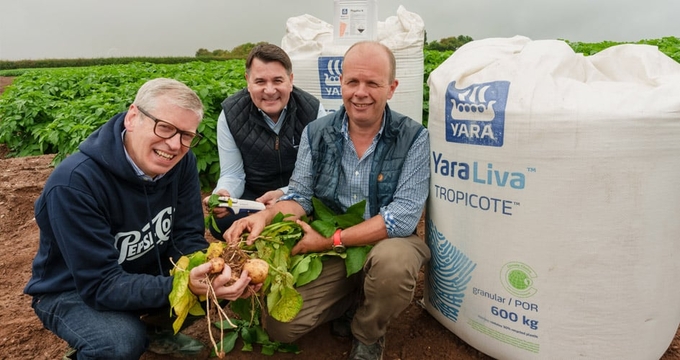November 20, 2025 | 12:44 GMT +7
November 20, 2025 | 12:44 GMT +7
Hotline: 0913.378.918
November 20, 2025 | 12:44 GMT +7
Hotline: 0913.378.918

Yara will deliver up to 165,000 tons of fertilizer per year to PepsiCo. Photo: Yara.
As part of the partnership, which spans multiple countries, participating PepsiCo Europe farmers will be equipped with best-in-class crop nutrition products and advice as well as precision farming digital tools. This will allow them to increase nutrient use efficiency (NUE), boost yields and reduce the carbon footprint of their crops. Yara, the leading crop nutrition company in Europe, will supply PepsiCo with the products and services.
Yara will deliver up to 165,000 tons of fertilizer per year to PepsiCo, covering around 25% of their crop fertilizer needs in Europe by 2030. These fertilizers will be mostly Yara Climate Choice fertilizers, which include low-carbon footprint fertilizers produced from either renewable ammonia (Herøya, Norway) or low-carbon ammonia via carbon capture and storage (CCS), currently under construction in Yara Sluiskil.
The mix will also include Yara’s standard premium nitrate-based mineral fertilizers produced using natural gas, which have a carbon footprint that is around 50% lower than most non-EU fertilizers thanks to the use of catalyst technology. The aim of the partnership is to upgrade to Yara Climate Choice fertilizers over time as production scales up and technologies mature so that all of the 165,000 p.a. tons are Yara Climate Choice fertilizers by 2030.
The collaboration underlines the companies’ shared commitment to building a more sustainable food system in line with the European Union’s climate targets. At the same time, it will support farmers through transition costs to ensure their livelihoods are not adversely impacted.
The partnership, which will help drive the adoption of regenerative agricultural practices, will include approximately 1,000 farms, covering a total of around 128,000 hectares across the European Union and the UK. Efforts will initially focus on potatoes, a key crop for PepsiCo, and then expand to other crops such as oats and corn.
Fertilizers are the biggest opportunity to reduce emissions as fertilizer production and in-field emissions account for half of PepsiCo’s average potato carbon footprint in Europe.
Translated by Quynh Chi

(VAN) Flagship partnership secures additional GBP 16.9 million to strengthen forest monitoring, transparency and country support to 2030.

(VAN) After a turbulent year for international development, the aid and assistance landscape has shifted, with donors rethinking how, where and why they support sustainable development.

(VAN) A new tool for measuring the economic value of farm animal welfare improvements has been developed, potentially transforming how consumers, retailers and the government evaluate animal welfare policies.

(VAN) The Amazon rainforest could face a renewed surge of deforestation as efforts grow to overturn a long-standing ban that has protected it.

(VAN) Conflict and violence are driving extreme hunger in six major crises.

(VAN) European Union member states are seeking to postpone the implementation of the bloc's anti-deforestation law by another year, an EU negotiating draft dated November 10 shows.

(VAN) Nearly 30 new avian influenza outbreaks have recently been reported in Germany, both on commercial poultry farms and in backyard flocks.